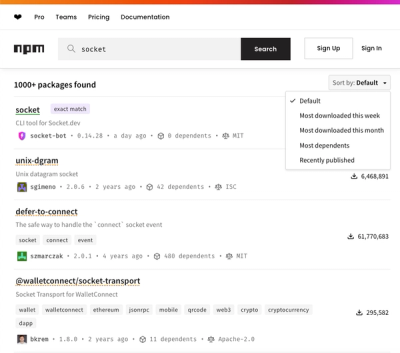
Security News
npm Updates Search Experience with New Objective Sorting Options
npm has a revamped search experience with new, more transparent sorting options—Relevance, Downloads, Dependents, and Publish Date.
barkoder-react-native
Advanced tools
React native support for Barkoder - a Barcode Scanner SDK for the modern enterprise.
The barKoder SDK React Native plugin grants an easy to use React Native solution with a great interface that can be integrated in both iOS and Android apps.
Integrating the barKoder Barcode Scanner SDK into your Enterprise or Consumer-facing mobile apps will instantly transform your user's smarphones and tablets into rugged barcode scanning devices without the need to procure and maintain expensive and sluggish hardware devices that have a very short life span.
The barKoder barcode scanner SDK is a relatively new product in an established market, already developed to be as advanced if not more than other competitor API's. Its robust barcode reading engine can be used to read the content of the most widely used barcodes with lightning fast speed and unprecended recognition rate:
1D - Codabar, Code 11, Code 25, Code 39, Code 93, Code 128, EAN-8, EAN-13, Interleaved 2 of 5, ITF-14, MSI Plessey, Pharmacode, Telepen, UPC-A & UPC-E
2D - Aztec Code, Aztec Compact, Data Matrix, PDF417, Micro PDF417, DotCode, QR Code & Micro QR Code
You can check out our free demo app Barcode Scanner by barKoder available both via Apple App Store & Google Play Store.
You can find full documentation about the barKoder Barcode Reader SDK plugin for React Native here: https://docs.barkoder.com/en/v1/react-installation
If you run the barKoder Barcode Scanner SDK without a valid trial or production license, all results upon successful barcode scans will be partially masked by asterisks (*). You can get a trial license simply by registering on the barKoder Portal and utilizing the self-service for Evaluation License Generation! Each trial license will be good for an initial duration of 30 days and can be deployed to up to 50 devices. For any custom requirements, contact our sales team via sales@barkoder.com
Note that a trial license is only supposed to be utilized in a development or staging environment. IF you decide to publish a trial license along with your app to the App Store, Play Store or any public store we won't be held accountable for any potential consequences.
Our support is completely free for integration or testing purposes and granted through the barKoder Developer Portal. After registering and logging into your account, you only need to submit a Support Issue. Alternatively, you can contact us by email via support@barkoder.com
Install the dependencies and setup your environment
To add the barkoder-react-native package to your project, you have two options. You can either use the barkoder-react-native package from npm or from a local path.
To use the package from npm run this command:
yarn add barkoder-react-native
if you are using YARN in your project or
npm install barkoder-react-native
if you are using NPM in your project.
If you prefer to use a local package, download the package from https://barkoder.com, unzip the archive and add the package with setting the package path
yarn add <path to barkoder-react-native package>
if you are using YARN in your project or
npm install <path to barkoder-react-native package>
if you are using NPM in your project.
If you are having trouble with iOS, try to reinstall the dependencies by running pod install command inside ios folder:
cd ios
pod install
Import the barkoder-react-native package in your project with:
import { Barkoder, BarkoderView } from 'barkoder-react-native';
At this point the barkoder-react-native package is installed and imported in your project. Next step is to add the BarkoderView in your layout and set the licenseKey parameter and onBarkoderViewCreated callback.
<SafeAreaView style={styles.container}>
...
<BarkoderView
style={styles.barkoderView}
licenseKey="KEY"
onBarkoderViewCreated={(barkoder: Barkoder) => onBarkoderViewCreated(barkoder)} />
...
The license key is a string that concists of alphanumerical characters. See the Trial License Section to learn how to get a valid license.
Inside onBarkoderViewCreated callback function the SDK is fully initialized and ready for configuration or to start the scanning process
async function onBarkoderViewCreated(_barkoder: Barkoder) {
barkoder.setBarcodeTypeEnabled(Barkoder.BarcodeType.qr, true);
barkoder.setRegionOfInterestVisible(true);
...
setBarkoder(barkoder);
}
function scanPressed() {
barkoder.startScanning((result) {
// The result from successful scan is received here
});
}
For the complete usage of the barkoder-react-native package please check our sample.
Our SDK requires camera permission to be granted in order to use scanning features. For Android, the permission is set in the manifest from the package. For iOS you need to specify camera permission in Info.plist file inside your project
<key>NSCameraUsageDescription</key>
<string>Camera permission</string>
FAQs
React native support for Barkoder - a Barcode Scanner SDK for the modern enterprise.
The npm package barkoder-react-native receives a total of 89 weekly downloads. As such, barkoder-react-native popularity was classified as not popular.
We found that barkoder-react-native demonstrated a healthy version release cadence and project activity because the last version was released less than a year ago. It has 0 open source maintainers collaborating on the project.
Did you know?

Socket for GitHub automatically highlights issues in each pull request and monitors the health of all your open source dependencies. Discover the contents of your packages and block harmful activity before you install or update your dependencies.

Security News
npm has a revamped search experience with new, more transparent sorting options—Relevance, Downloads, Dependents, and Publish Date.

Security News
A supply chain attack has been detected in versions 1.95.6 and 1.95.7 of the popular @solana/web3.js library.

Research
Security News
A malicious npm package targets Solana developers, rerouting funds in 2% of transactions to a hardcoded address.